The 1980s time-warp of the London-Scotland sleeper train
- Published
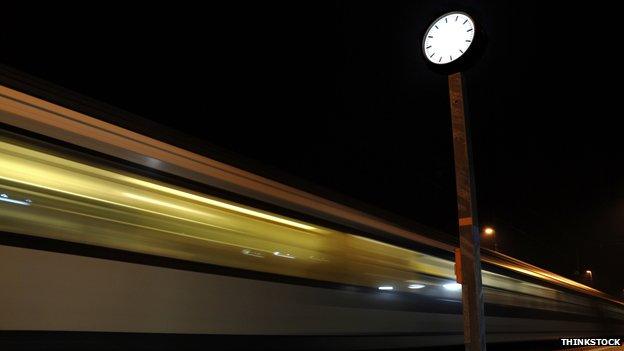
Across Europe, sleeper trains seem more and more of a quaint anachronism, but the UK is overhauling an old and famous overnight route, writes Adrian Quine.
The overnight sleepers running between London and Scotland, are about to get a much needed facelift.
The Scottish Government announced this week it is jointly funding a £100m investment in new trains that promise a four-class service with a bar and bistro, sleeping pods, private cabins with beds, desks, wi-fi - even showers. Michelin-star chef Albert Roux is doing the catering.
UK firm Serco, which runs the Ghan and Indian Pacific trains in Australia, has been awarded the sleeper contract. The current trains haemorrhage public money and the sleepers were almost scrapped altogether when the railways were privatised in the mid-1990s.
An outcry from an eclectic mix of peers, landowners, walkers and train buffs kicked off a high-profile campaign. The slogan "The Deerstalker Express" was born and the trains became so popular passengers had to book months in advance. Red-faced civil servants gave up and safeguarded the trains for a further 18 years.
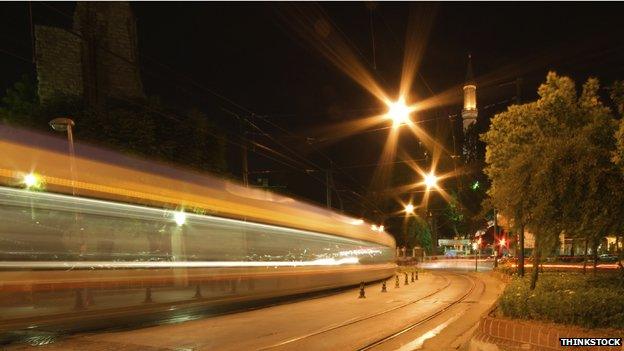
Despite being badly marketed and suffering from cramped 30-year-old trains, the sleepers have retained a loyal, almost cult following. For anyone who has travelled on them on a regular basis - me included - it's not difficult to see why they are held in such affection.
The experience of being rocked to sleep as the train speeds through the Home Counties to wake up to the vast wilderness of Rannoch moor is pleasantly disorientating.
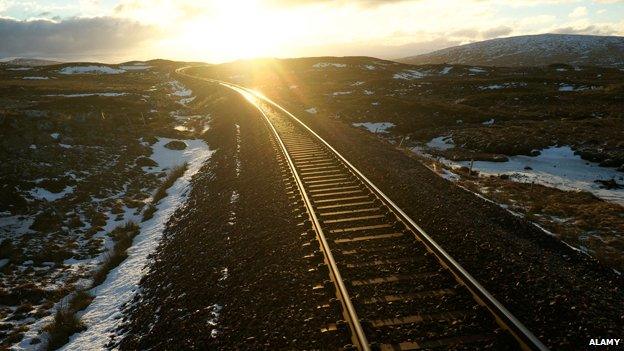
The sun rises over Rannoch Moor
Even the train's staff find the experience exhilarating. Driver Robert Buchanan recalls getting a knock on his locomotive cab door as the sun rose over the West Highlands to find the Duke of Gloucester, plus his two black Labradors, asking if he might be allowed to come up for a ride.
"It's the most enviable job," he says. "Everybody wants to drive the Scottish sleeper."
Certainly the atmosphere aboard the train is about as far removed from the 08:24 commuter train from Basingstoke to Waterloo as you can get. Passengers mingle in the lounge car - a curious mix of captains of industry, politicians, academics, landowners, hikers and train buffs. Most are regulars - many on first name terms with the crew.
The surroundings are replete with 1980s style furnishings. The lounge cars are the only coaches in Britain with loose seats of aluminium-tube design, looking like something out of a discotheque. The walls are carpeted and the spotlights subdued, all adding to the rather obscure time-warp sensation.
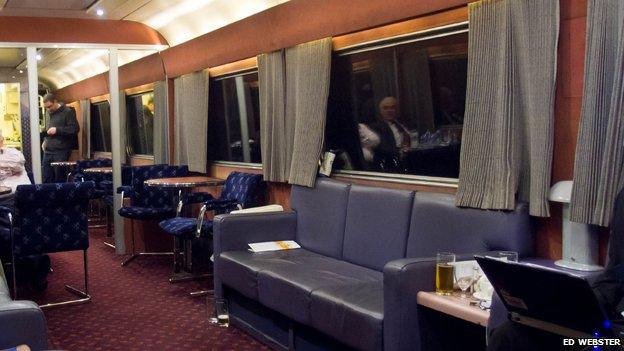
Caledonian Sleeper, lounge
The stewards tend to passengers' every whim with a dog-eared cardboard menu that consists of tins of Baxters soup, "haggis, neeps and tatties" or a standard-issue pre-packed bacon roll - all heated up in the "pantry" microwave.
What the food lacks in culinary finesse is made up for at the bar. By the time the train reaches Crewe, passengers are often pretty merry - discretion thrown to the wind. Wily journalists can regularly find out more about what is going on in the corridors of power between London and Crewe than during a whole week at Westminster.
A sleeper steward told me a story once that, had it not been in the first person, I would have sworn was apocryphal.
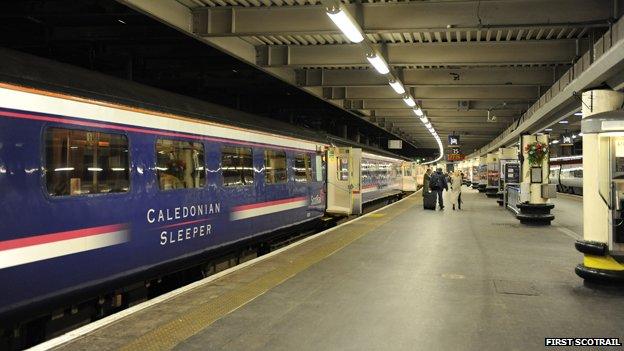
In the lounge car, after several drams, a female passenger became acquainted with a male oil worker. Sleeping in adjacent coaches that night, she eventually sneaked down the corridor.
But unbeknown to either of them, the train split in the small hours of the morning and she woke to find herself admiring the view of the North Sea near Aberdeen as her clothes and belongings pulled into Crianlarich, 100 miles to the west.
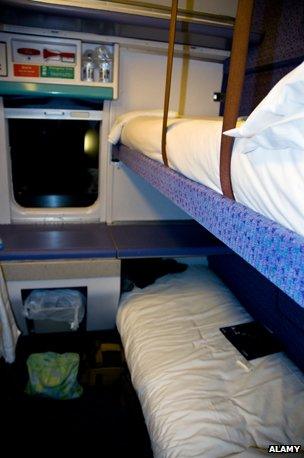
A cabin on the Caledonian Sleeper
The steward recalls having to think on his feet when questioned by her irate husband. Waiting on the platform he was baffled as to how the train had somehow managed to lose one of its passengers.
Sleeper berths are an acquired taste - regular travel is required to acclimatise and get a good night's sleep. Single, standard passengers often end up sharing their twin berths with snoring strangers of the same sex. On the Glasgow train it's not uncommon for the train to be drunk dry.
The Edinburgh train tends to have a more sober atmosphere, full of academics and business people.
Fund manager Tom Wright is a regular passenger. He uses it for convenience as it departs after the last flight and arrives before the first one lands the following morning.
"I don't mind taking the sleeper but facilities even in first class are worse than the second class journeys between Bangkok and Chang Mai I took 25 years ago," he says.
"Hotels in London are now so expensive that if they upgraded it to be even half as comfortable as a hotel then they might do quite well."
Barrister William Frain-Bell agrees: "Turning it into something akin to the Orient Express Pullman is great news as long as the fares don't rocket."

Aboard the Orient Express with James Bond: Daniela Bianchi in From Russia With Love
Scotland's late First Minister Donald Dewar used the train regularly once breaking the "sleeper record". He travelled it five times in one week after which he quipped that he could not remember in which direction he was going - much to the amusement of his political opponents.
Gordon Brown and the late John Smith would also enjoy unwinding on a Friday night, with a drink in the small hours as they headed north.
The beds are compact. If you are taller than 5ft 10in or have a waist greater than 34in they can be a challenge. Turn once too often and you will end up in a heap on the floor.
But Britain's sleepers with their narrow bunks and stained, chipped enamel wash basins have one benefit over their European counterparts. Most berths are either solo or with twin beds.
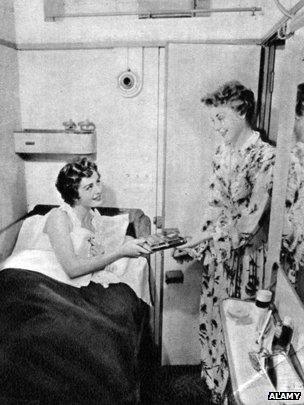
Sleepers have been around for over 100 years
In France, the basic sleeping carriages are made up of very cramped couchettes, reminiscent of a cheap youth hostel, where six strangers stretch out in very close proximity.
Not surprisingly, with the advent of an extended high-speed network on the continent and the relentless rise of low-cost airlines, the European sleepers are on the wane.
The Paris to Madrid service, which ran for over a century, was scrapped last year with little fanfare.
Britain can be said to be bucking the trend. The key to success will be price - both to the passenger and taxpayer.
As a regular sleeper passenger myself, I can't help feeling that it would be great if it could be made to work. Perhaps this new "hotel on wheels" is to be the catalyst for the future shape of Britain's railways.
Follow @BBCNewsMagazine, external on Twitter and on Facebook, external